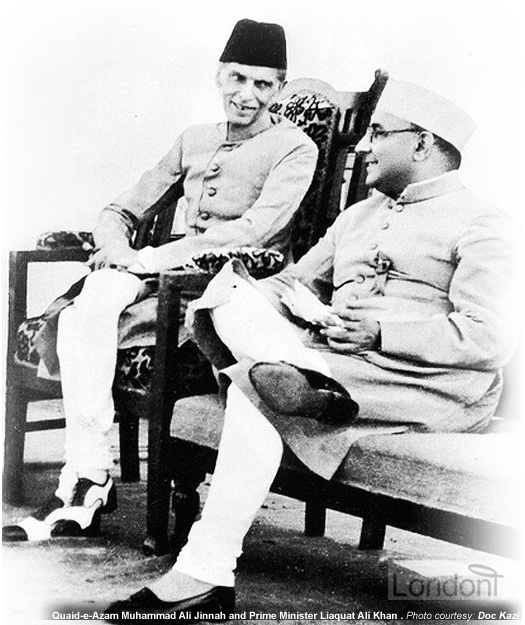
Educational conference decides to drop Bangla
Last updated: 5 October 2017 From the section 1952 Bhasha Andolon
On 27 November 1947, a government-sponsored Education Conference was held in Karachi, the then capital of Pakistan. It was initiated by Pakistan's Minister of Education Fazlur Rahman, a Bengali, with the object of introducing reforms into the educational system and promotion of Islamic ideology. The conference also decided that Bengali would be dropped from all government stationeries, including money order forms, envelopes and postcards, which would be printed only in Urdu and English. Non-Bengali leaders of West Pakistan declared that Urdu had to be the national language of Pakistan. It was to be the only language used in the media and in schools.
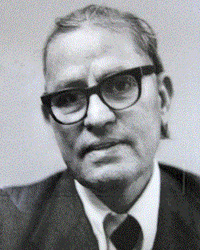 Fazlur Rahman ()
Fazlur Rahman ()
Naturally, opposition and protests immediately arose in East Pakistan where the Bengali-speaking people made up over 60% (44 million) of Pakistan's 69 million population. They viewed this exclusion of Bangla as further attempt to undermine their identity, having already been neglected for official posts such as Pakistan's government, civil services, navy, and military, which were dominated and controlled by Urdu speaking West Pakistanis.
This decision was opposed by the members of Tamaddun Majlish as well as others belonging to East Pakistan as they were attending the conference.
The dynamic process of national integration, generated by the enthusiasm of a separate homeland, was disrupted by the language controversy only after three months of independence.
"Maago Ora Bole" by Abu Jafar Obaidullah
Student demonstration
The Sangram Parishad vehemently protested the exclusion of the Bengali language from the newly-issued money, postal stamps, coins, and office forms of the Government of Pakistan. Public outrage spread, and on 5 December 1947 Bengali teachers and students of Dhaka University had their first street demonstration in favour of Bengali, arguing for their linguistic rights as majority part of the nation of Pakistan.
The next day, another protest meeting was held in the campus of DU against the government-sponsored National Education Conference held in Karachi. Their aim was to build resistance against the reactionary and anti-Bengali policies of Muslim League government. It attracted a large number of students, teachers and others from Dhaka University and other educational institutions. Professor Abul Kashem presided over the protest meeting, and a number of students and teachers including Munier Chowdhury, Abdur Rahman, Kallayan Dasgupta, A.K.M. Ahsan, S. Ahmed, and Farid Ahmed, the Vice President of Dhaka University Central Students Union (DUCSU), addressed the meeting.
Farid Ahmed's resolution demanding Bangla should 'take priority in so far as it was a national language of the Pakistani State and at the same time the official language for teaching and the courts in East Pakistan' and condemning the anti-Bengali role of Daily 'Morning News' were unanimously adopted in the meeting.
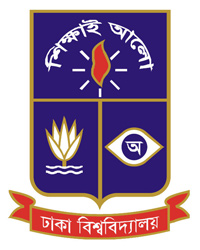 University of Dhaka (aka DU or Dhaka Bishobidaloi) ()
University of Dhaka (aka DU or Dhaka Bishobidaloi) ()  Farid Ahmed ()
Farid Ahmed () 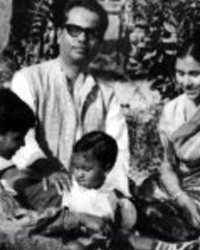 Munier Chowdhury ()
Munier Chowdhury ()  Abdur Rahman ()
Abdur Rahman ()  Kallayan Dasgupta ()
Kallayan Dasgupta ()
The meeting was followed by a large procession demanding official status of Bengali. The demonstrators met various ministers including Syed Mohammad Afzal, Nurul Amin and Hamidul Huq Chowdhury all of whom gave assurance to support the cause of Bengali.
The position of Tamuddun Majlish regarding the Bengali Language Movement also reflected the aspirations of the common people of East Bengal.
The demonstrators were already denouncing what they termed the 'betrayal of Bengal and the people of East Bengal'. After this meeting they marched through the streets of the eastern capital. At the same time, at Sylhet, in the northeast of the country, the partisans of Urdu were apprising the Prime Minister of the province, Khawaja Nazimuddin, of their point of view, but they were very much in the minority and theirs was an isolated action.
Christoph Jaffrelot, editor of "A History Of Pakistan And Its Origins" (2002)
During those days, an admixture of Bengali and Urdu had been in popular use in Old Dhaka. Many people in old Dhaka did not favour the idea of making Bengali a state language. In order to create public opinion in favour of Bengali in old Dhaka, Prof M A Quasem formed an organisation named 'Dhaka Majlis' with Syed Mohammad Taifur and Abdul Mannan as President and Convenor respectively.
On 12 December 1947, a group of Urdu-supporting people of old Dhaka attacked Bengali-supporters of the Engineering and Medical College area chanting pro-Urdu slogans. When they reached the Palashi Barrack area, they were resisted by Bengali- supporters. Some 20-30 people received injuries as a result of the encounter. Students along with some other people of the area brought out a procession against the incident, met some ministers and forced them to give written undertaking that they would support the cause of Bengali language. The press note that was issued by the government on 12 December incident gave a concocted account and blamed three Calcutta dailies, the Ananda Bazar, the Ittehad and the Swadhinata, for the incident and banned their entry into East Bengal for 15 days with effect from 15 December 1947.
The New Nation (Bangladesh)
Few weeks prior to the student demonstration, on 15 November 1947, the Secretary of the Central Public Service Commission of Pakistan, Mr Goodwin, issued a circular concerning the examination of the superior civil service (which is used to recruit the civil servants and bureaucrats for the Government of Pakistan). In it he listed 31 subjects which can be studied, including 9 languages. These languages included Urdu, Hindi, English, German, French, even 'dead languages' like Sanskrit and Latin, etc. But Bangla, the languages spoken by the majority people of Pakistan, was not included. Outraged, Prof. Abul Kashem issued a press statement against this illogical move. This statement was published in the Daily Ittehad on 31 December 1947 along with a strongly worded editorial entitled 'Abishashya' (unbelievable) against Goodwin's audacity. When this issue of Daily Ittehad reached Dhaka, it created new enthusiasm among the language activists.
As 1947 gave way to 1948, the language issue intensified.
Chhatro (Student) League
The factionalism that existed in the Bengal Provincial Muslim League before Partition had its impact also on its student wing, the All-Bengal Muslim Student League. After partition, this organisation had split into two largely on the question of leadership. One group led by Anwar Hussain and Shah Azizur Rahman supported the (Khwaja) Nazimuddin group of the Muslim League and the other led by Nooruddin and Sheikh Mujibur Rahman supported Suhrawardy-Hashim group. The former thus formed the 'All-East Pakistan Muslim Student League' and the latter formed the 'East Pakistan Muslim Student League' on 4 January 1948. Naimuddin Ahmad, was elected convenor of the new organisation while Aziz Ahmad (Noakhali), Sheikh Mujibur Rahman (Faridpur), Oli Ahad (Comilla), Abdur Rahman Chowdhury (Barisal), Dabirul Islam (Dinajpur), Abdul Matin (Pabna), Mafizur Rahman (Rangpur), Sheikh Abdul Aziz (Khulna), Nawab Ali (Dhaka), Nurul Kabir (Dhaka city), Abdul Aziz (Kushtia), Syed Nurul Alam (Mymensingh) and Abdul Quddus Chowdhury (Chittagong) were elected members of the organising committee.
The East Pakistan Muslim Student League later became a non-communal organisation, and after the independence of Bangladesh was renamed to the (Awami League) Chhatro League.
The formation of East Pakistan Muslim Students League was an important event in the history of the Language Movement as it constantly supported the cause of Bengali Language.
The New Nation (Bangladesh)
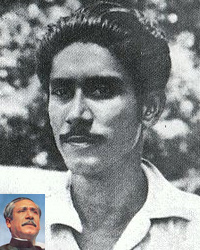 Sheikh Mujibur Rahman ()
Sheikh Mujibur Rahman ()  Nooruddin ()
Nooruddin ()  Anwar Hussain ()
Anwar Hussain () 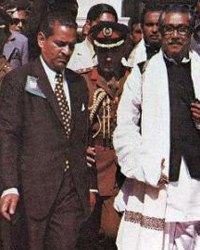 Shah Azizur Rahman ()
Shah Azizur Rahman ()  Naimuddin Ahmad ()
Naimuddin Ahmad ()
On 1 February 1948, a delegation of the Rashtrabasha Sangram Parishad met Fazlur Rahman and protested against the omission of Bengali in the Public Service Examinations and currency notes. Three weeks later, on 23 February 1948, Pakistan's constituent assembly convened in Karachi, having met in the inaugural session on 11 August 1947.

